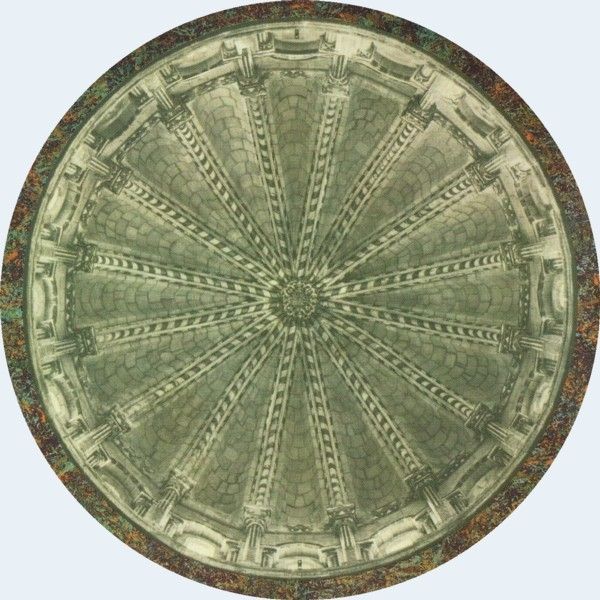Fallen Women / Sarband & Osnabrücker Jugendchor
Women as Composers and Performers of Medieval Chant
Arab-Byzantine Tradition · Kassia ·
Hildegard von Bingen · Codex Las Huelgas
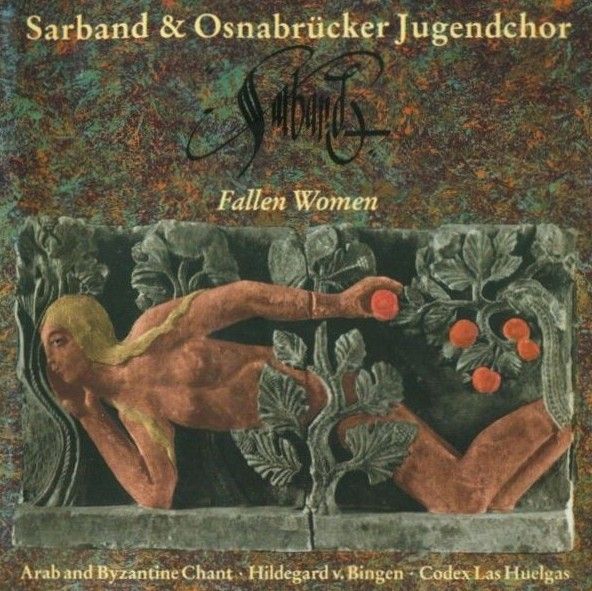
medieval.org
Jaro 4210-2
1997
Osnabrück
1. Alyâwm
[5:05]
Maronitic chant · 14th antiphon of the office on Good Friday
oral arab-byzantine tradition
FH · VI · CH
02. Alleluia. Victimae pascali laudes
[2:06]
prose, Easter · Codex las Huelgas, 13th c.
CH
03. HILDEGARD von BINGEN. O magne
pater [5:42]
FH · BS · MK · CH
04 - Alleluia [2:26]
antiphone from the octoechos
The daughter of Ioannes Kladas (Constantinople, late 14th cent.)
Athens, MS 2406, fol. 258v
FH · BS
05. Benedicamus virgini matri
[1:20]
2v Benedicamus · Codex Las Huelgas, fol. 163v
FH · BS
06. Catholicorum concio
[3:36]
2v Benedicamus · Codex Las Huelgas, fol. 22
CH
07 - KASSIA. Augustus
[4:14]
Sticheron Idiomelon Doxastikon · vespers of December 25
FH · BS · MK dulcimer · CH
08. Rex virginum amator
[2:12]
2v Kyrie trope · Codex Las Huelgas
FH · BS
09. Kyrie eleyson
[3:00]
Greek-Arabic Kyrie trope · oral tradition
FH · BS
10. Inna Mussa
[3:13]
Arab-byzantine tradition
FH · BS · VI · CH
11. Salve regina glorie
[4:08]
2v prose · Codex Las Huelgas, fol 80
FH · BS voice, shawm · MK dulcimer · VI · CH
12. HILDEGARD von BINGEN. O plangens
vox [3:45]
Ordo virtutum
FH · BS · MK · CH
13 - KASSIA. The Fallen Woman ·
Kyrie [7:09]
Troparion, Orthros of Holy Wednesday · Athens, MS 883, fol. 261v
BS · MK dulcimer · CH
14. Mundi dolens de iactura
[1:30]
3v motet · Codex Las Huelgas, fol. 89
CH
15. Ya Rabbi [7:16]
Arabic version of the Kyrie The Fallen Woman
FH · VI · CH
16. Psallat chorus ~ Eximie pater ~
APTATUR [1:45]
3v motet · Codex Las Huelgas, fol. 114v
CH
17. HILDEGARD von BINGEN. Rex noster
[4:57]
Responsorium · De innocentibus
FH · BS · MK · CH
18. Audi, pontus, Audi, tellus
[4:03]
cantio · Codex Las Huelgas, fol. 156v
BS
The Fallen Women, probably influenced by politically correct language, become Sacred in Dorian DOR-93235:
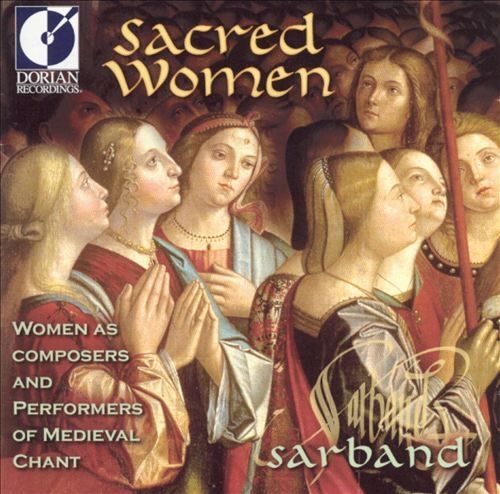
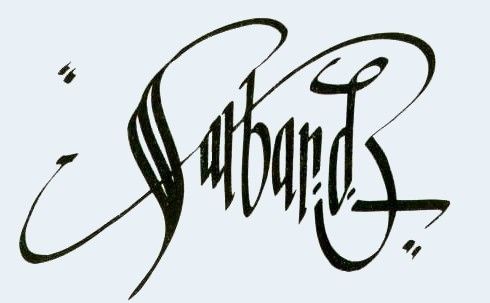
SARBAND
Vladimir Ivanoff
FH · Fadia el-Hage, Beirut · voice
BS · Belinda Sykes, London · voice, shawm
MK · Marianne Kirch, München · voice, dulcimer
VI · Vladimir Ivanoff, München · frame
drums, ud
CH · Osnabrücker Jugendchor
Johannes Rahe, dir.
Recording: Vladimir Ivanoff, Osnabruck Cathedral 1997
Recording assistant: Rainer Wittig
Post production: Vladimir Ivanoff, Munich 1997
Producer: Vladimir Ivanoff
Executive producer: Ulrich Balß
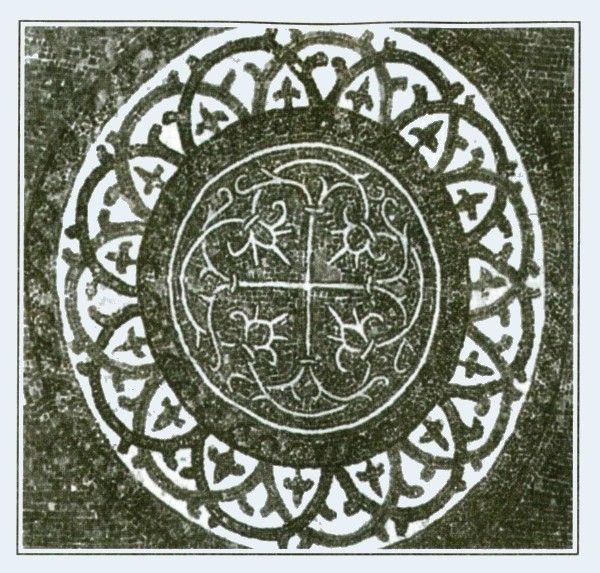
Early Christian Women's Chants in the Middle Eastern Churches
The liturgical music of many early Christian churches of the Near East
can be traced back to the Patriarch of Antiochia and its rites. In the
same way the Maronitic church, a Christian denomination which emerged
latest at the time of the first crusades in Syria and in today's
Lebanon, was shaped mainly by its Middle Eastern surroundings.
Until today, in spite of many changes and reforms in the details, the
Maronitic as well as the Melchitic and Syrian-catholic rites have
handed down and kept alive chants dating back to the first centuries of
Christianity. The early Christian Syrian heretics (i.e. Bardaisan and
Paul of Samosata) cultivated women's choirs and women's solo chants
(although the apostle Paul had already forbidden women to sing church
chants). This powerful and still living tradition, however, provoked a
ban (if only officially) in the late 4th century which forbade women's
chants in the liturgy.
Kassia
Kassia (810-?) is certainly the most significant female composer of
Byzantine church music. According to the chronicles of the Byzantine
Empire the highly educated court lady belonged to the court circle of
women from whom the emperor Theophilos was to choose his wife. When he
realised that she was far superior to him in intelligence, education
and wisdom, he rebuked her. Because of this she spent the rest of her
life in a convent. 49 liturgical chants and a number of secular,
moralising songs have been attributed to her. In her work "Augustus the
Monarch" she compares the reign of the emperor Augustus with that of
Christ's. The troparion "The Fallen Woman" was written after her entry
into the convent. It clearly contains a number of autobiographical
elements.
Hildegard von Bingen
Hildegard von Bingen (b.1098, Bemersheim-Bergen, near Alzey / 17th
September 1179, Rupertsberg near Bingen) is known to us as a mystic and
prophetess and as an advisor to popes, emperors and princes. She wrote
a great number theological, scientific and medical texts.
Since her childhood she was haunted by visions which she wrote about in
a number of texts and songs. Hildegard's music is a world of its own.
It has an enlarged melodic range, rich melismatic passages, and a
structure that involves few melodic modules and incorporates a mixture
of various genres. Her language is characterised by an astounding
clarity and illustrates her apocalyptic visions.
The large melodic range, chromaticisms, changes of the final of the
mode and its frequent instability (especially in the d-modes) were the
very opposite of the then new Cistercian chant. Purists had declared
features which had already been sanctified by custom as being
irregular. These variations must have been common in old Carolingian
chant —they still exist in Byzantine chant. In the ecclesiastical
context of her time, Hildegard's work appears like a vigorously
traditional new song.
Codex Las Huelgas
The Cistercian convent of Las Huelgas de Burgos was founded in 1187 by
the Castillian King Alfonso VIII and his wife Eleonor of England. It
has always been an aristocratic recluse and a burial site for
Castillian kings and queens. During the reign of Alfonso the Wise,
around 1257, the community was made up of 100 nuns from aristocratic
descent who sang in the choir, 40 aristocratic girls who received an
education from nuns and 40 novices as well as a community of priests,
Jewish doctors, muslims, officials, surgeons, gardeners and stone
masons.
Since its writing around the turn of the 13th century the Codex Las
Huelgas has been in the possession of the convent. It is a simple
parchment manuscript that contains compositions for everyday use. It is
a large collection of liturgical and secular works. Its contents
include pieces from the Parisian Notre Dame school as well as works in
a more modern, motet style. All of them were adapted to the local
style.These compositions were sung by the women in the convent, with
the exception of the Ordinary and the Proper of the Mass. There were
also choirs and soloists of both sexes who sang in separate choirs.

Sarband
The name 'Sarband' stems from Persian and Arabic, and denotes the
improvised joining of two parts of a musical suite. Vladimir Ivanoff
founded the Ensemble Sarband in 1986, to point out possible links
between European music and the Islamic and Jewish musical cultures.
With sensitivity and intensity, Sarband realizes the connection of
Orient and Occident. The continuous musical collaboration among the
members of the ensemble ensures that a dialogue on equal terms is
maintained. It is the exchange of practical musical experience between
musicians from different cultures that make the performances of Sarband
fascinating, lively and extremely authentic.
In their performance of European and Oriental medieval music, the
Turkish, Italian, English, Bulgarian, Arab and German musicians
participating in this project draw upon the colorful palette of
instruments, vocal and instrumental techniques and the art of
improvisation which are still to be found in Islamic culture today.
Sarband's unique repertoire has won them wide acclaim internationally.
Over the past years Sarband has performed at numerous international
Festivals of varying orientations ranging from Early Music to
Avantgarde.
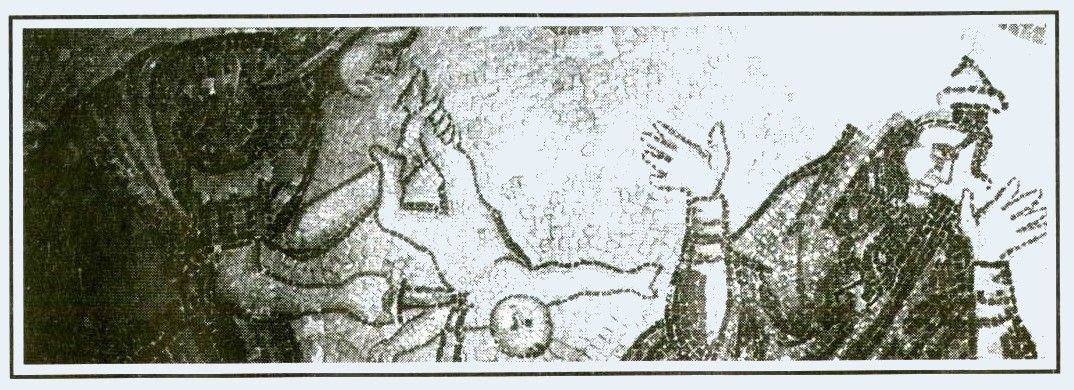
Reviews
"Before you decide from the disc's title that this is yet another
Anonymous 4 clone, believe me, it couldn't be further from it. Although
we hear some familiar chants among the rare and there are women singing
them, they're performed in such a different style - often with
instruments (shawm, dulcimer, drums, ud), an added chorus (including
men), and sometimes a deep-voiced drone - that we find ourselves in an
entirely different world (literally) from that of Anonymous 4's
ultra-refined, pure-voiced, ethereal idiom, essentially influenced by
central and northern European chant traditions. Sarband's roots are
more earthly - and centered in Eastern Europe and the Mediterranean -
yet its musical foundations and vocal expressiveness are equally
grounded in the spiritual realm. Many of the 18 selections - from
ancient manuscripts including the Codex Las Huelgas - feature a
prominent solo voice, in this case the captivating Lebanese singer
Fadia El-Hage, whose technique recalls the highly ornamented,
melismatic forms of today's Middle Eastern/Northern African popular and
religious music, where lines are elaborately shaped with curlicue
turns, where a single pitch is stretched and bent and reshaped with
inflections as complex and varied as those of spoken language. At other
times, we hear a chorus, but its role - largely conceptualized and
arranged by Saraband founder/director Vladimir Ivanoff - is unlike what
we're used to in early chant repertoire. Unisons, fourths, and fifths
abound but the ensemble singing is far more dramatic, driven not only
by the text and its natural accents, but also by an apparent desire to
engage the listener's senses beyond the spiritual. (Have you ever heard
the Easter chant Victimae paschali laudes performed almost as a
dance?)
Many of the chants come from Hildegard von Bingen and ninth-century
Byzantine female composer Kassia; others are adapted from
Arab-Byzantine oral traditions. All are performed in a style that will
not only surprise most Western listeners, but also encourage us to
rethink the nature of religious singing tradition in the early church.
There has been much attention lately devoted to reinvestigating and
reimagining the origins, practices, and development of Christianity. In
that regard, this recording, whose performers seek to explore the
"possible links between European music and the Islamic and Jewish
musical cultures" offers not only an enjoyable musical experience, but
an enlightening one as well. "
arkivmusic.com
Subtitled Women as Composers and Performers of Medieval Chant,
this 2001 release is a mesmerizing program of early Christian women's
chants - expressions of women's spirituality, rooted in mysticism and
seeking ecstatic connection with the infinite - in spite of a
4th-century ban which forbade women's chants in the liturgy! Founded to
demonstrate the relationships between European early music and the
musical cultures of Islam, Sarband is a fascinating, lively and
authentic international ensemble of musicians from several Middle
Eastern and European countries, including Lebanese vocalist Fadia
El-Hage (known to our listeners for her work with Vox), and UK vocalist
and shawn/bagpipes player Belinda Sykes. Here they perform chants from
Middle Eastern churches; works by Hildegard; chants by Kassia, the most
significant female composer of Byzantine church music who wrote during
9th century; and from Codex de las Huelgas, a large collection of
liturgical and secular works sung daily by the Cistercian nuns of the
convent of Las Huelgas de Burgos. Recommended!
ladyslipper.org
